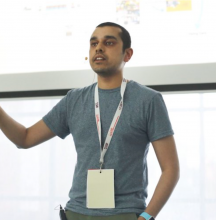Abstract
Psychological safety is fundamental for successful teams as it allows people to take risks and feel confident that no one on the team would embarrass or punish anyone else for admitting mistakes, asking questions or offering new ideas. But taking those risks doesn't come naturally to people and needs to be nurtured. Why? Because people have a natural tendency to look up in the hierarchy as to what is and isn't acceptable. Therefore if we model behaviors that show that it is safe for interpersonal risk-taking, it helps others see that they, too, can take these risks.
In this talk, I'd like to share what psychological safety is, why it matters to software teams and how Staff+ engineers can foster environments high in psychological safety.
I will start with a definition of psychological safety to build a shared understanding that engineers can use to aid their discussions of the topic. I'll share case studies of why it matters and how it benefits software teams. Then finish with some practical steps on how Staff+ engineers can foster psychological safety in their environments.
You can view an online version of the presentation with animations you can click through here. For additional resources you can visit this link.
Interview:
What's the focus of your work these days?
I've been working with many different teams over the last couple of years, and I’m typically brought in to help with testing issues. But when I started digging into those problems, I realised that testing isn't the problem. It’s all the other things that happen early in the process that are causing the team issues; it's just that the problems manifest during testing. And typically the problems are usually related to relationships that cause a lot of friction in teams. So I've been focusing much of my time in that space, specifically on psychological safety.
What's the motivation for your talk at QCon London 2023?
Essentially, I was trying to figure out what's going on in teams, why they are having so much trouble talking to each other and how we can help them. The more we looked into it, the more we realised that some people were reluctant to speak up in certain situations. And we couldn’t understand why. Why were some people OK and then not others? And the more research we did, the more we saw that communication skills were not evenly spread in teams.
At the same time, we started to come across this idea of psychological safety, and the more we dug into that, the more we began to realise that this is what's holding some of our teams back. If we could unlock this, we could improve our team's performance and hopefully deliver more value to our users.
How would you describe your main persona and target audience for this session?
It's going to be mainly Staff+ engineers. But in terms of what I'd like them to take away from this is that it is leadership that can make a significant impact on psychological safety. But team members play an essential part too. The thing about Staff+ engineers is that they sit in a grey area between leaders and team members, and it's in this grey area that Staff+ engineers can make an impact that other people can’t. While they're not official leaders, they are looked up to by other team members. And while they're not official team members, they are getting hands-on with the teams. So, I hope we can enable Staff+ engineers to increase psychological safety in this space by modelling behaviours that show them speaking up and creating spaces that allow team members to speak up too.
Is there anything specific that you'd like people to walk away with after watching your session?
This is for people who already think psychological safety is something we need in teams but still need to figure out how they can help. So the core aim of this talk is to discuss how can Staff+ engineers can help foster environments high in psychological safety. One of the key takeaways is that they can walk away with some steps to get started with psychological safety with their teams.
I'd also like to help those unsure of psychological safety and whether they should even care about it. And those that are maybe on the fence who think they don’t need to worry about this and perhaps convince them that they should focus on psychological safety a little more and that they can do something about it too.
Speaker

Jitesh Gosai
Principal Tester @BBC
Jitesh Gosai has 20 years of experience, working with various companies enabling them to build, test and release at scale. He is currently a Principal Tester at the BBC in the iPlayer & Sounds department, working with Mobile, TV and Web teams. His core aim is to create a Quality Culture by helping teams build quality into their products. In his free time, he likes to speak about his experiences at conferences all over Europe and blogs regularly at https://www.jitgo.uk/blog and tweets @jitgo





